Yom HaShoah 2019 Remarks
05/02/2019 02:13:33 PM
May2
| Author | |
| Date Added | |
| Automatically create summary | |
| Summary |
Introduction
Good evening. My name is Rabbi Ben Goldberg and on behalf of KTI and the other participating synagoguesâ€"Community Synagogue of Rye, Congregation Emanu-El of Westchester and the Jewish Community Center of Harrisonâ€"thank you for joining us this evening for this important commemoration of Yom HaShoah, Holocaust Remembrance Day.
Our gathering tonight feels all the more urgent in light of the attack on the synagogue in Poway, CA last Shabbat. We mourn the loss of Lori Gilbert-Kaye, who by all accounts was a dedicated, generous and loving member of that community. We pray for the speedy recovery of those wounded: Rabbi Yisroel Goldstein, the synagogue's spiritual leader; Noya Dahan, an 8 year-old girl; and Almog Peretz, her uncle visiting from Israel for Passover.
Part of what makes shootings like the one in Poway so striking is that they are reminiscent of the long history of persecution of the Jewish people, part of which we are gathered to remember tonight. Throughout our long history, we have seen how hateful words and suspicious conspiracy theories eventually can turn into expulsions and violence against us. The Holocaust was but one dramatic example of this pattern, a pattern that continues even now, as we were so forcefully reminded a few days ago.
This year, the organizing committee chose the theme of early warning signs for our ceremony tonight. This theme draws our attention to the fact that the Holocaust did not begin with ghettos or deportations or concentration camps or gas chambers. Rather, it began with hateful rhetoric, discriminatory laws, and extremist ideas creeping into the mainstream.
Tonight, several members of our community will share their or their parents' and grandparents' responses to the early warning signs of the Holocaust. When and how did they decide to leave? How did they realize that things would get worse and not better? What did they see that others tragically missed? These personal stories will put a human face on what easily can become an impersonal historical narrative.
Once again, thank you for joining us this evening as we remember one of the saddest chapters in our long history as a people.
Rabbi's Remarks
When I was in college, one of the most popular courses was a class on the history of the Holocaust taught by Professor Peter Hayes. For good reason the class was so popular: Hayes is a spellbinding lecturer, and the material itself is inherently compelling to students, Jews and non-Jews alike, who wanted to better understand this often-discussed but poorly-understood period in history.
Professor Hayes is an economic historian, whose own research focuses on the behavior of large German corporations before, during, and after the Holocaust. But he has also dedicated large parts of his career to increasing public understanding of the Holocaust and making the massive scholarly literature on the subject accessible to the public.
The capstone of decades of his work as a public scholar is this book he published in 2017: Why? Explaining the Holocaust, which was based on his class. Hayes concludes the book with an anecdote that is highly relevant to our theme this evening of early warning signs, or, as Hayes puts it, using a German proverb: beware the beginnings.
Hayes writes that he is often asked at public lectures when and how the Holocaust could have been prevented or stopped. Perhaps surprisingly, he points to a precise time and place: April 5, 1933, in Berlin.
On April 1, the same day as the Nazi boycott of Jewish-owned shops in Germany, a company of Nazi storm troopers occupied the offices of the National Association of German Industry. The association was led by a prominent industrialist named Gustav Krupp von Bohlen und Halbach, who also led the Krupp armaments and steel company. The storm troopers disrupted the activities of the association and refused to leave the office until it dismissed all of its employees who were Jews or who were affiliated with other political parties.
Krupp, who was part of the old German elite who thought they could exploit Hitler for their own purposes, tried to intervene with Hitler to have his storm troopers leave. Hitler refused, explaining that he could not restrain the enthusiasm of the people who had helped him achieve power. After just a few days, on April 5, Krupp capitulated, firing the targeted employees and breaking their employment contracts with the association.
Eight days later, one of the members of the association's governing board, a man named Georg von Muller-Oerlinghausen, wrote what Hayes calls a “prophetic protest” to Krupp. Von Muller wrote that Krupp's actions amounted to surrendering to bullying and, more importantly, “deprived the organization of all basis for future noncompliance with Nazi demands.” If Krupp was unwilling to stand up for the contractual rights of his own employees, whom was he willing to defend, and on what grounds?
von Muller, we can see in hindsight, was painfully right. Krupp became an ardent Nazi and major supplier of armaments to the Nazi regime. But von Muller was also right that the way things begin, and the way that powerful people respond to new realities, sets a precedent and a direction for the future.
If powerful people could so easily be coerced into firing their Jewish employees, then it wouldn't take much to get their cooperation, or mere silence, in the much more nefarious persecution that was to come. Had more Germans been like von Muller, and fewer like Krupp, in those early months of the Nazi regime, perhaps things would have turned out very differently.
Beware the beginnings. Beware the Pharaoh who does not know Joseph. Beware how quickly and easily norms can shift. Beware the ways that human weaknesses like wounded pride and fear and prejudice and ambition and hate can have disastrous consequences.
We've heard several stories tonight about early warning signs and the need for us to remain vigilant about anti-Semitism in particular and hateful ideologies in general. These stories have broken our hearts, but they also inspired us to make “never again” more than just a slogan. May our vigilance serve as a fitting memorial for the millions we remember tonight.
We will now shift our attention from these stories to the blessed memory of those who perished in the Shoah, with the words of El Malei Rachamim, the memorial prayer, on page 10.
Fri, November 14 2025
23 Cheshvan 5786
Photo Gallery
Photo Albums
|
(7 Albums) 1
|
-
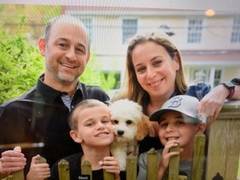
Paws With Your Pet!
Our KTI extended family & their furry friends....
(14 photos) -
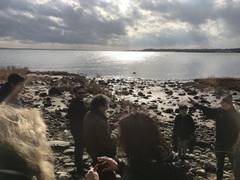
Trees, Torah & Tu Bishvat Hike
(12 photos) -
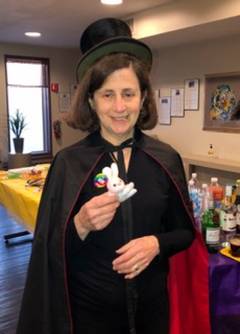
Megillah Reading - Happy Purim!
(10 photos) -
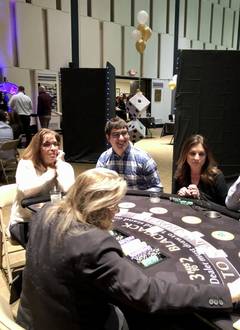
Casino Night Fun!
Saturday evening, February 1, 2020
(28 photos) -
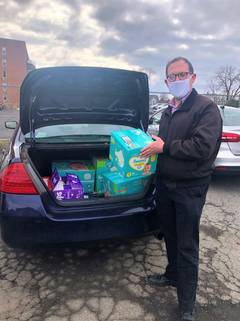
Social Action in Action!
(3 photos) -

Gala 137 - A Night November to Remember
(43 photos) -

KTI Gala 137 Journal
(44 photos)
|
(7 Albums) 1
|
Fri, November 14 2025 23 Cheshvan 5786
Upcoming Events
All Events
-
Friday ,
NovNovember 14 , 2025Give Thanks at Tot Shabbat 2025
Friday, Nov 14th 5:00p to 6:00p
-
Tuesday ,
NovNovember 18 , 2025Women's Rosh Chodesh Group
Tuesday, Nov 18th 12:00p to 1:30p
New Women's Rosh Chodesh Group Tuesdays, 12:00-1:30pm Gather with Cantor Sklar and KTI friends at the start of each month of the Hebrew calendar to learn about the themes and traditions of the coming month. Learn from each other, learn more about each other and better understand the women within our tradition. Enjoy music and lunch together! Please a dairy or parve lunch to enjoy at noon, followed by the discussion at 12:30pm. KTI will provide drinks and dessert. RSVP Appreciated -
Wednesday ,
NovNovember 19 , 2025Rabbi, May I? Modern Responsa
Wednesday, Nov 19th 10:00a to 11:30a
Wednesdays, 10 - 11:30 AM, KTI Library Ever since Abraham’s famous argument with God, Judaism has been full of debate. Moses and Korah, David and Nathan, Hillel and Shammai, the Vilna Gaon and the Ba’al Shem Tov, Spinoza and the Amsterdam Rabbis . . . the list goes on. No wonder that Judaism cherishes the expression machloket l’shem shamayim, “an argument for the sake of heaven.” Beyond their historical importance, what makes these disputations so compelling is that nearly all of them, regardless of their epochs, are still being argued. The parade of characters spanning three millennia of biblical, rabbinic, and modern disputation reflects the panorama of Jewish history with its monumental political, ethical, and spiritual challenges. This series will examine Jewish responses to exile from the biblical period to our modern day. Considering texts from all genres of Jewish literary creativity, we will explore how the realities and iterpretaions Join as we re-open these timeless debates that lead us to the core of 3,000 years of Jewish conversation. • Justice: Abraham vs. God (October 19) • Holiness and Authority: Moses vs. Korah (November 9) • Inclusion: The Five Daughters vs. the Twelve Tribes (November 30) • Accountability and Morality: David vs. Nathan (December 21) • Resistance: Ben Zakkai vs. the Zealots (January 18) • Law: Hillel vs. Shammai (February 15) • Spirituality: The Vilna Gaon vs. the Baal Shem Tov (March 15) • Boundaries: Spinoza vs. the Amsterdam Rabbis (April 19) • Religious Evolution: Geiger vs. Hirsch vs. Frankel (May 10) • Zionism: Herzl vs. Wise (May 31) -
Wednesday ,
NovNovember 19 , 2025Wrestling with God
Wednesday, Nov 19th 8:00p to 9:30p
Wrestling with God Wednesdays, 8-9:30 PM Congregants’ homes TBA We need to talk about God. And about how we talk, and don’t talk, about God. It’s a big topic, maybe the biggest. This offering invites adult learners into compassionate inquiry, deepening their relationship to Jewish text through collective exploration. Using the album s*ngs ab-ut g?d [https://open.spotify.com/album/6JEY2AN6awAxNfWwmXX460] by Jewish educator Eliana Light as a starting point, this series blends music, Hebrew text study, and open-ended questions to help participants examine their own connections to the divine. This is sacred work. It’s not about getting it right. It’s about showing up with curiosity, humility, and a willingness to join the long lineage of Jews who wrestle with God. Each session stands alone, but we’d love to have a consistent group as much as possible. Dates: September 10: skyman October 22: shadows November 19: in the silence December 10: if only January 21: lead me back February 11: three steps March 11: beyONEd April 29: the mountains May 20: the name June 17: I rise -
Thursday ,
NovNovember 20 , 2025Coffee with the Rabbi
Thursday, Nov 20th 8:00a to 9:00a
Start your morning with some caffeine and casual or meaningful conversation! Join Rabbi Goldberg for a Coffee Chat! Stop by Rye Ridge Starbucks any of the following Thursdays, between 8-9am: June 12 and 26 July 10 and 24 August 7 and 21 September 4 and 18 October 16 and 30 November 6 and 20 December 4 and 18
Privacy Settings | Privacy Policy | Member Terms
©2025 All rights reserved. Find out more about ShulCloud

